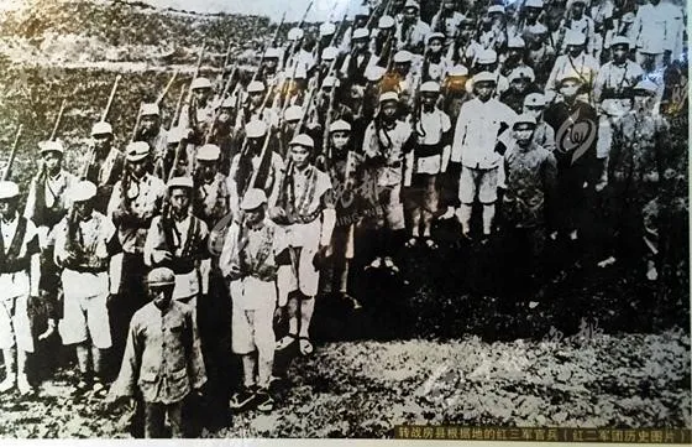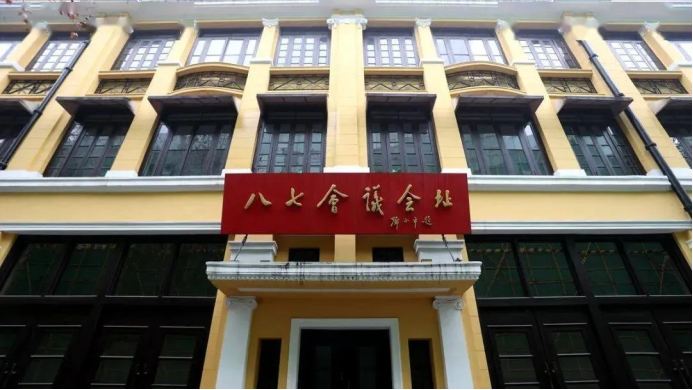The Party History Stories around Me (IV)
Source: cugjdxy
He Anxiang (Information and Communication Engineering 2021-2)
My name is He Anxiang and I come from Anqing City, Anhui Province, a heroic city deeply impregnated with the spirit of revolution. Since ancient times, Anqing, a famous historical city, has been home to many talented people. Since modern times, many heroes have emerged in Anqing, such as Chen Duxiu, the early leader of the Communist Party of China, his sons Chen Yannian and Chen Qiaonian, Deng Jiaxian, the "hero of two bombs", the famous scholar Zhu Guangqian, the famous meteorologist Ye Duzheng and so on.

Statue of Comrade Chen Yannian in Anqing Youth Palace
In the brilliant party history of Anqing, the two brothers Chen Yannian and Chen Qiaonian played pivotal roles. The two brothers were born in the former residence of Nanshuiguan in Anqing. After completing their basic education in Anqing, they went to Shanghai study in French tuition classes under the influence of their father. They were admitted to Aurora University to study law, where they began to get in touch with some new ideas and edited the magazine "Gong Yu". Later, they went to France to study abroad, where they began to contact Marxism, and then they were developed into full-fledged party members by the party organization and sent to Moscow to study. After completing their studies, the two brothers returned to China and actively participated in the revolution and played an important role. Unfortunately, due to the betrayal of the traitor, the two brothers were arrested one after another, and soon afterwards they died heroically. Throughout their unyielding lives, the two brothers have made indelible contributions to the party and the people, and inspired generations of young people to devote themselves to China's revolution, construction, and reform.
Today, under the leadership of the party, the people of Anqing continue to carry forward the courage to take the lead and the spirit of forging ahead. They are down-to-earth, forge ahead, and strive for the first place, and continue to win successive phased victories in economic construction. Thanks to the great progress made in economic development, the education, medical care and environment in Anqing area have been greatly improved, and the people's sense of happiness and gain has become stronger and stronger, and they are working hard on the new journey to a higher level of socialism.
![]()
![]()
![]()
![]()
![]()
Lu Tongcheng (Information and Communication Engineering 2021-2)
My hometown is Shiyan City, a red land stained with blood. From the establishment of the first party branch in 1926 to the birth of new China, the people of Shiyan have written a colorful chapter in the magnificent history of Chinese revolutionary struggle.
In mid May 1931, the Red Army led by He Long was besieged by more than 10 Kuomintang regiments in Baokang County, and was forced to break through and turn to Jiudaoliang area at the junction of Fangxian County and Xingshan in Northwest Hubei. Local party organizations actively help the Red Army to raise food and grass, and arrange for the rest. In mid-June 1935, the Third Red Army captured Fang County, and the Western Hubei Special Subcommittee of the Communist Party of China with Liu Keming (Liu Zhixun) as the secretary was established. Under the leadership of the Western Hubei Special Subcommittee, the Third Red Army mobilized the masses extensively to carry out the agrarian revolution, and successively established 14 district-level and 105 township-level Soviet regimes. In Shiyan's 24,000 square kilometers of land, almost every inch of land has been sprinkled with the blood of martyrs, and almost every inch of land has the footprints of heroes who have fought. The evocative spirit of dedication of the revolutionary martyrs has become the precious spiritual wealth of the people of Shiyan, and it has also greatly enriched the connotation of the red culture.

The officers and soldiers of the Third Red Army who transferred to the Fangxian base area
![]()
![]()
![]()
![]()
![]()
Zhu Xinyu (Information and Communication Engineering 2021-2):
My hometown is Wuhan, Hubei Province. On July 23, 100 years ago, the first National Congress of the Communist Party of China was held in Shanghai, and 5 of the 13 delegates attending the meeting were from Hubei. After the failure of the First Revolutionary Civil War, at a critical moment concerning the future and destiny of the party and the revolutionary cause, the "August 7th Meeting" was held in Wuhan. At the meeting, Mao Zedong put forward the famous thesis that "government comes from the barrel of a gun", which has far-reaching influence. The leaders of the subsequent Nanchang Uprising, Autumn Harvest Uprising, and Guangzhou Uprising all set off from Wuhan.

Site of August 7th Meeting"
The site of the August 7th Meeting is located at No. 139 Poyang Street, Hankou, Wuhan. On August 7, 1927, 21 revolutionaries including Qu Qiubai, Mao Zedong, and Deng Zhongxia, together with representatives of the Communist International, two Russian comrades, and Deng Xiaoping, the political secretary of the Central Committee, risked their lives to convene an emergency meeting here to review and correct the serious mistakes of Communist Party of China in the later period of Great Revolution and to decide new routes and policies. From then on, the Chinese Revolution began a historic change from the failure of the Great Revolution to the rise of the Agrarian Revolutionary War.
From June to October 1938, the Chinese army launched a battle in Wuhan with the Japanese invading army in the Wuhan area. The Communist Party of China supported and actively cooperated in the defense of Wuhan. Before the start of the Battle, the CPC agencies in Wuhan actively participated in the mobilization and propaganda work and donation activities on the defense of Wuhan and the protracted war of resistance, which greatly encouraged the enthusiasm of the soldiers in front to kill the enemy. The soldiers fought bloody battles along the north and south sides of the Yangtze River in the periphery of Wuhan, fighting hundreds of times, killing and wounding more than 257,000 Japanese troops at the cost of more than 400,000 casualties, which greatly consumed the viable force of the Japanese army. After that, the Chinese Anti-Japanese War entered a stage of strategic stalemate.
Looking back on the course of a hundred years of struggle, in this hot land of Wuhan, generations of Chinese Communists have worked stubbornly and unremittingly. A large number of revolutionary martyrs, a large number of heroes who fought tenaciously and a large number of advanced models who sacrificed themselves have emerged, building the spiritual pedigree of Chinese Communists. At present, our country is facing major changes unseen in the world in a century. As party members in the new era, we must dare to fight, strive for progress, overcome all risks and challenges, and strive unremittingly for the realization of the two centenary goals.